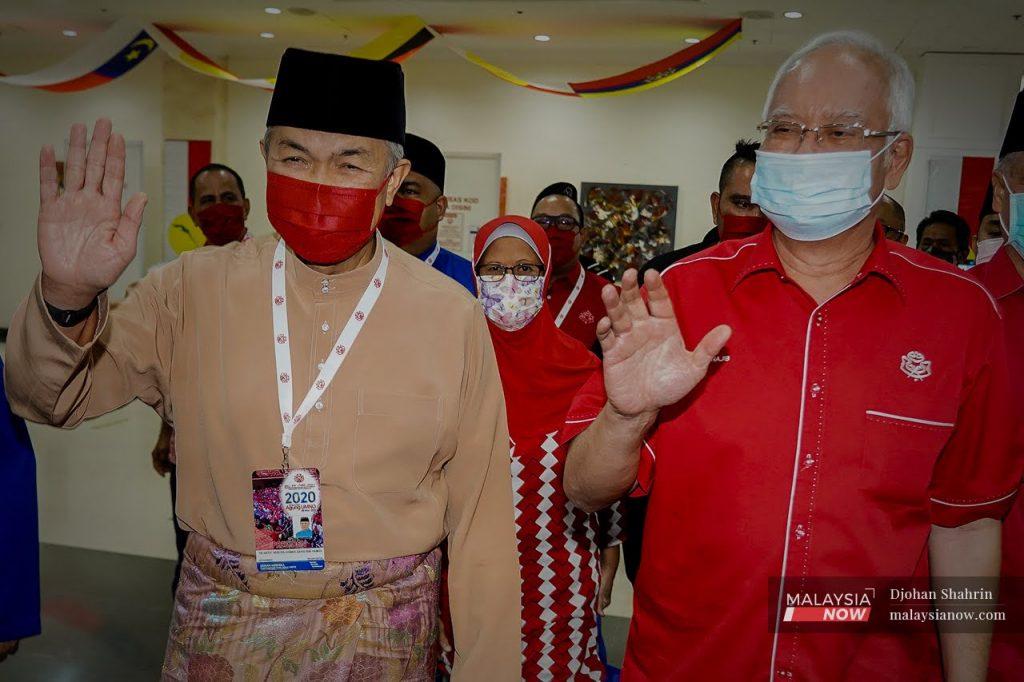With ‘Taliban’ power structure, ‘big brothers’ can make life tough for Ismail, says seasoned Umno watcher
Najib Razak and Ahmad Zahid Hamidi will pose a huge challenge to the prime minister's efforts to win public trust.
Just In
A seasoned Umno watcher has compared Umno’s power structure to that of the Taliban group in Afghanistan, where a set of elderly warlords continue to wield strong influence despite the perception of having younger and more “open-minded” leaders in its fold.
Ahmad Atory Hussain said in such a scenario, Prime Minister Ismail Sabri Yaakob would face huge challenges winning the trust of the people and managing the public perception of his administration while his party Umno remains under the authority of “big brothers” Najib Razak and president Ahmad Zahid Hamidi.
He said since their hopes of settling their “troubles” in court by toppling former prime minister Muhyiddin Yassin never materialised, Najib and Zahid would use their influence in Umno to up the pressure on Ismail.
“They have appeared dissatisfied since Muhyiddin’s ouster,” Atory, a Universiti Sains Malaysia professor who has studied Malay politics for decades, told MalaysiaNow.
“They thought once the prime minister had been replaced with their own candidate, they would be able to settle their cases.
“I don’t think it’s as simple as that.”
Atory was referring to Zahid’s ongoing trial for bribery, abuse of power and criminal breach of trust (CBT).
Zahid, who was Najib’s deputy when the pair led the previous Barisan Nasional government, faces a total of 47 charges – 12 counts of CBT, eight of bribery and 27 of money laundering involving funds from his charity outfit Yayasan Akalbudi.
Najib meanwhile has already been sentenced to 12 years in jail and fined RM210 million over his conviction of seven counts of CBT, abuse of power and money laundering involving RM42 million from SRC International.
“I think Ismail will face the same fate as Muhyiddin, and that he too will have trouble from these two.”
The former prime minister is appealing against his conviction and sentence.
Ismail came to power with support from the Perikatan Nasional (PN) coalition led by Muhyiddin.
Muhyiddin had however said that this support was contingent on several conditions, including a caveat that Ismail’s Cabinet should not include those who are facing criminal charges in court.
Muhyiddin also said that any PN government under Ismail’s leadership must respect the concept of separation of powers and the independence of the judiciary.
Atory said this had been clear as well during the so-called Sheraton Move, during which Umno laid down the condition that Muhyiddin bring Bersatu out from the Pakatan Harapan (PH) coalition.
“But the hidden condition here is to solve their court troubles,” he said.
Muhyiddin lost his fragile majority after a group of MPs from Umno aligned with Zahid withdrew their support for him.
Taliban-like structure?
Ismail, who was sworn in as his replacement last month, is now faced with the dilemma of managing the public perception of his administration and maintaining his position in Umno.
His meeting with Najib at the Prime Minister’s Office on Tuesday has only added to the pressure on him.
“Umno has been burdened with the problems of Najib and Zahid,” Atory said.
“I think Ismail will face the same fate as Muhyiddin, and that he too will have trouble from these two.”
He said even though the meeting might not have touched on Najib’s court cases, it would be difficult to stop intense speculation on how Ismail would determine the former leader’s fate in court.
Other Umno leaders facing criminal charges in court include former Tabung Haji chairman Abdul Azeez Abdul Rahim and party secretary-general Ahmad Maslan.
Atory said the strength of Najib and Zahid lies in the hands of Umno warlords, the majority of whom are division leaders in rural areas.
He also drew a comparison between Umno and the Taliban in terms of structure and their source of power.
“In Afghanistan, the Taliban leaders are elderly people who know nothing of the outside world,” he said.
“The young go off to Oxford or Cambridge. But they have no place in politics as it is run by the old guard.
“Umno, like the Taliban, is influenced by the grassroots which, although less educated, nonetheless dominate politically.”
Unlike PKR, he said, Umno has a line-up of potential leaders. But he said such individuals must engage with the rural folk and the voters in Felda settlements in order to replace the court cluster.
“Leaders like Khairy Jamaluddin, Hishammuddin Hussein and Shahril Sufian Hamdan need to go to the villages, too. Don’t just stay in Kuala Lumpur,” he said.
Subscribe to our newsletter
To be updated with all the latest news and analyses daily.
